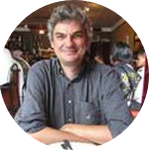About This Project
Can you mimic a biological system using electrical analogs? Could that electrical system be so interactive that it helps students learn? That’s what Dr. Herbert Sauro is trying to figure out. Dr. Sauro wants to build an electrical circuit that mimics part of a biological system, giving students an idea of how genes operate in cells.Ask the Scientists
Join The DiscussionWhat is the context of this research?
Our electric circuit will have bar graph LEDs to represent the activity of the different genes and we’ll have control knobs to change how strong a gene can influence another gene. Through this type of experimental building and learning, students will be able to interact with aspects of biology and genetics in a new way, all through first interacting with a circuit and then controlling the behavior of the system. We hope to make the circuits modular -- one module per gene -- so that a student can simulate different gene systems by connecting the modules in different ways.
What is the significance of this project?
There is significant opportunity to use this project to teach students about electronics, analog computers and genetics, a most unusual mix of topics. We can provide a video, booklet, and circuit boards for others to build similar systems.
What are the goals of the project?
We already have a design for the circuit. The task is to build a prototype. Once we have it working we will get printed circuits made so that the students can build the final version. The entire systems will be partially enclosed in a plexiglass case with access to the control knobs and simulation LED indicators. Some years ago we successfully built something similar that was related to protein modeling. This time we would like to extend the problem to gene regulatory networks.
Budget
We already have the skills in house to do what is required. We need funds to purchase components and provide a small amount of funds to the student who will build the device.
Meet the Team
Team Bio
Dr. Herbert Sauro is an Associate Professor in the Department of Bioengineering at the University of Washington. He earned his Ph.D. in Computational Biochemistry from Oxford Brooks University, M.Sc. in Biological Computation from University of York, and B.Sc. in Biochemistry and Microbiology from University of Kent.
Interested in learning more about Dr. Sauro? Check out his website and blog.
Herbert M Sauro
Dr. Herbert Sauro is an Associate Professor in the Department of Bioengineering at the University of Washington. He earned his Ph.D. in Computational Biochemistry from Oxford Brooks University, M.Sc. in Biological Computation from University of York, and B.Sc. in Biochemistry and Microbiology from University of Kent.
Interested in learning more about Dr. Sauro? Check out his website and blog.
Additional Information
Recent publications:
Copeland WB, BA Bartley, D Chandran, M Galdzicki, KH Kim, S Sleight, CD Maranas, HM Sauro. 2012. Computational tools for metabolic engineering. Metabolic Engineering. In Press.Project Backers
- 39Backers
- 102%Funded
- $1,184Total Donations
- $30.36Average Donation

